
How a group of ukrainian women built a safe haven in displacement
25/09/2023
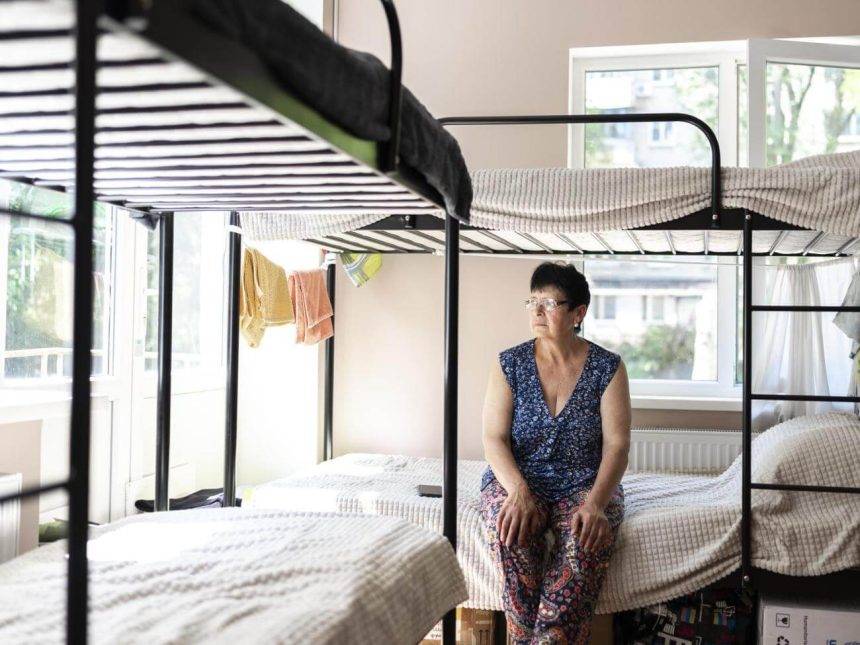
Dnipro — Oleksandra patiently cuts the edge of a piece of fabric; she loves making clothes. Outside, sounds of sirens and dinosaurs fill the air. The sirens are raising the alarm about incoming air raids, while the dinosaurs – life-sized, tail-wiggling replicas of T-rexes, triceratops and other extinct creatures – put on a show for visitors to the Dino Park next door.
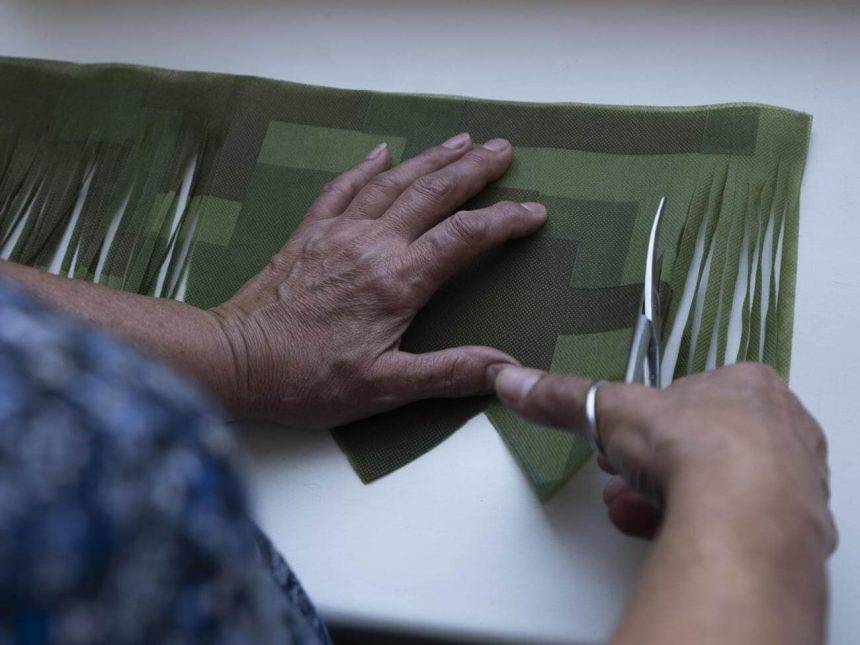
It was only recently after rehabilitation by women-led volunteer groups with support from local and international organizations including the International Organization for Migration (IOM) and the European Union that the building where Oleksandra is sheltering found new purpose, providing a safe haven to people fleeing war.
Oleksandra had not wanted to leave her home in Bakhmut in eastern Ukraine. But when the fighting reached her local neighbourhood, she knew it was time. Her small city in the region of Donetsk was taken over by the Russian Federation in May 2023 after extensive fighting, razing it to the ground. Today, fighting continues in the shell of a city where it is estimated that less than 1,000 of the more than 70,000 residents remain.
“I always thought ‘I must hang in here just a little bit longer and everything will be ok. I am ok with this.’ But the fighting crept closer and closer, and with it, all the destruction,” she recalls.
“My own house was hit. The bombing was so intense, and this stressful and traumatic experience brought on all kinds of health complications for me, and all the doctors had left already.”
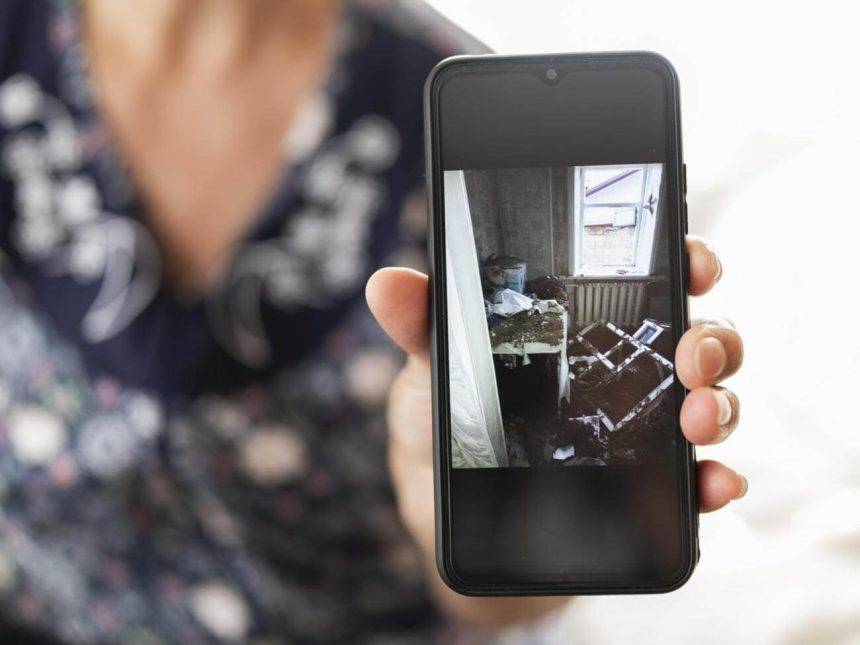
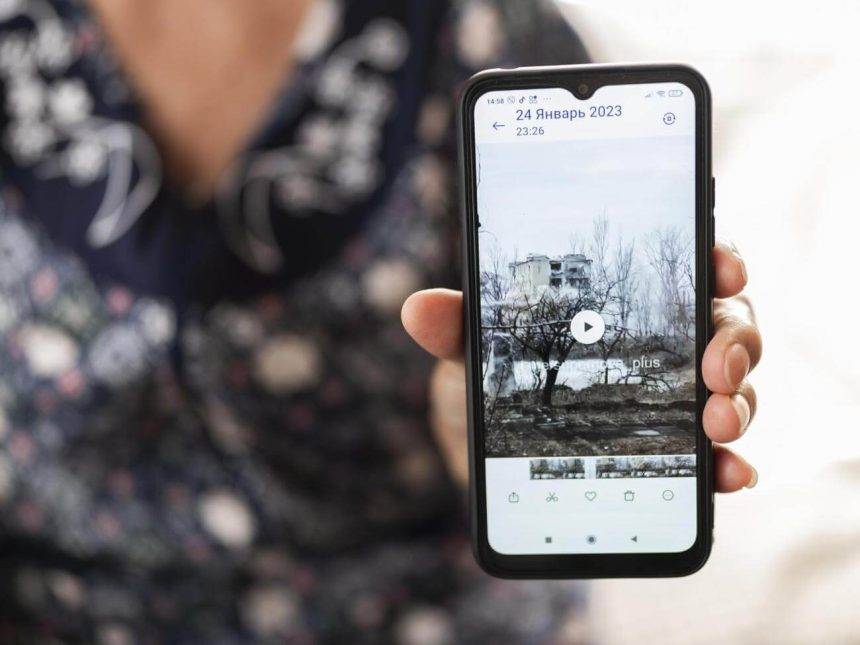
“My own house was hit. The bombing was so intense, and this stressful and traumatic experience brought on all kinds of health complications for me, and all the doctors had left already.”
When Oleksandra arrived at the collective centre in Dnipro city, she was devastated. She did not know it yet but when she was given a bed in a room shared with Lyudmila, from Lysychansk, Luhansk region, she started to build a new support network. Like Bakhmut, Lysychansk witnessed heavy fighting between Russian and Ukrainian forces resulting in large-scale destruction and mass displacement.
“Rockets hit our building, and the tail of one rocket was hanging there before our eyes. That’s when I decided to leave. I evacuated just two weeks before the Russian soldiers walked into the city. There was very intense street fighting,” Lyudmila says.
Lyudmila’s husband and son, in his early 40s, stayed behind to look after their home. For more than a year, she has not heard from them. Mobile service no longer works in Lysychansk due to damaged towers. Lyudmila does not know what has become of them.
“I haven’t heard my husband’s voice for over a year now,” Lyudmila continues with a trembling voice.
“I just want to ask him ‘how are you?’ and hear his voice say, ‘I am good’. That’s all I want. The only thing that keeps my spirit high is a family friend who went to Luhansk city a while ago told me that he saw my husband and son and they were ok.”
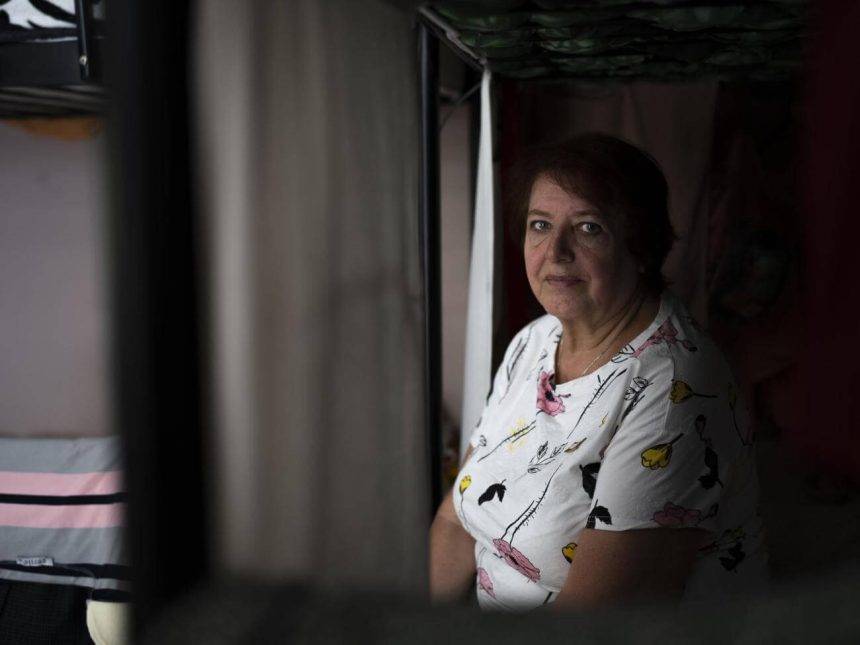
To cope with the stress of her family situation, Lyudmila built friendships with the women living in and running the collective centre – she even asked the management to help her keep busy. She is now in charge of managing the communal canteen, making sure the place is running smoothly, appliances are always clean and in working order, and everyone has access to what they need in the kitchen.
“It gets easier when you share your story with someone. That’s why I get along with Oleksandra and other people here so well because we understand each other, and we respect each other, we are all in this together.”
The 100 or so displaced persons living in this Dnipro city collective centre have built a cohesive and resilient community despite being constantly reminded of the war.
“We clean the building, we do the maintenance and everyone does something. And this is good to keep us busy. It is better than sitting and watching TV. For a minute you can actually forget about war, and we have to forget about the war, we have to forget about the fact that we have lost our homes. We need to cope with this,” says Oleksandra.
“This is not home. But we have a roof, a bed, safety, water and food. And we are so grateful for this. What keeps us going is that we will go home one day. Our memory of our homes gives us strength,” she adds.
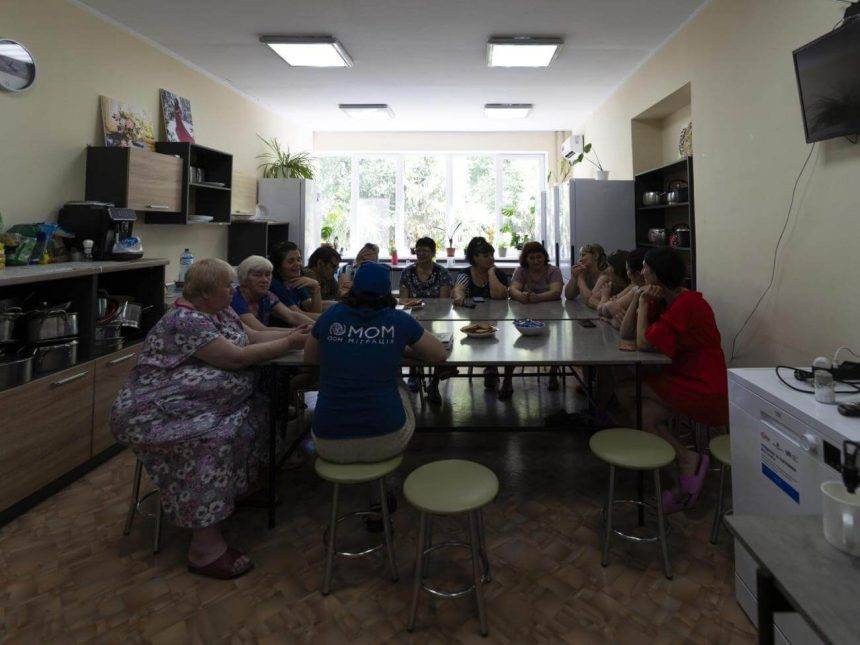
Before Oleksandra and Lyudmila moved into the collective centre, the building, which had been a care home for children, was falling apart. The roof was leaking. Doors and windows were broken. There was no furniture and appliances, nor utility services. And it was two more women, Anna and Nina, who drummed up support and led the charge to renovate the space and improve its conditions.
Anna was the former head of the Palace of Culture and then of Luhansk region Youth Centre before the war and her displacement. When Russian forces intensified attacks on her city, she also fled to Dnipro.
“I was faced with a lack of housing myself and seeing thousands of other displaced persons have lost everything and are without shelter made me want to do something,” Anna says.
Anna teamed up with volunteer groups supporting displaced persons, and she built a network with the aim of helping people facing a similar situation to herself. Among this network of volunteers was Nina. The youngest ever former head of Lysychansk Local History Museum, she had – before the war – ensured that the museum participated in international youth projects, while also promoting Luhansk’s local history as widely as she could.
Through both of their already established connections with the displaced Luhansk authorities, Anna linked up with the local authorities in Dnipro to secure the crumbling building to turn it into a collective centre for displaced persons. Then they mobilized their volunteer networks to reach out to international NGOs and UN agencies to get support with repairs to make the building habitable. And sure enough, a steady stream of support becoming flowing, including from IOM.
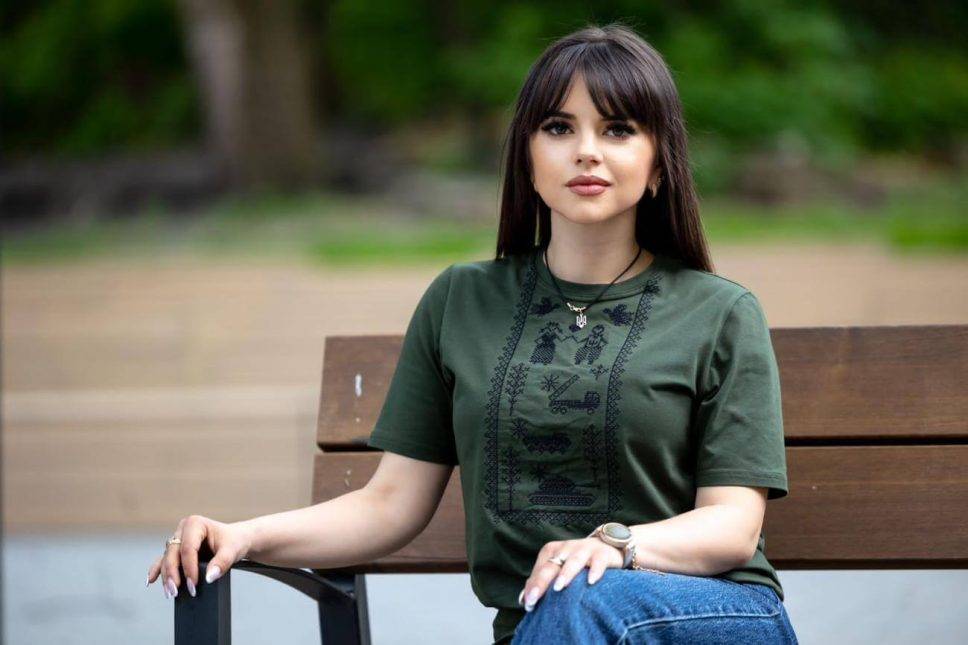
“I will never forget the first days when we opened the collective centre. These people did not just find shelter, but they also benefitted from the rehabilitation of the centre when they received their first payments. The feeling of gratitude in the eyes of the people we help is priceless,” shares Anna, explaining how residents of the centre were employed in the renovation works.
Through support from the European Union, IOM’s contribution to the project included repairing the damaged roof, paying for utilities and providing much-needed household items like beds and bed linen, chairs and tables for children, and dressers. In addition, IOM provided training and office equipment for the centre’s management team, Anna and Nina.
“The support we have received so far from international partners helps us not only to create better conditions for the residents, but also to become more independent. For example, IOM provided us with kitchen equipment, which means that the residents no longer have to rely on volunteers to bring ready-made meals: we can cook our own meals. Also, thanks to the repair of the roof, we can accommodate more people in the facility,” added Nina.
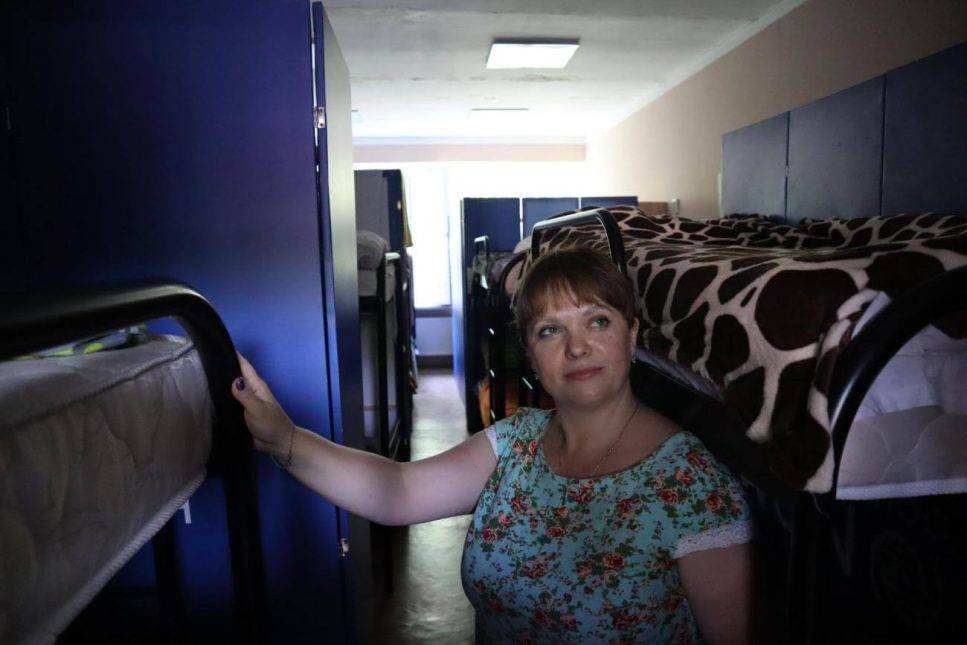
As the war continues, Nina hopes they can get more support to rehabilitate another part of the building to accommodate 300 more internally displaced persons, as well as make living conditions for the current residents more comfortable.
“When you work with people who have lost everything that they worked for their entire lives, you realise that these people need much more than a roof. Many of them have not heard from their loved ones for a long time and they do not know how they are doing,” says Nina.
For Anna, Nina, Lyudmila and Oleksandra the ideal future is one where everyone can return home. However, if the war keeps them in Dnipro, they have bigger plans for the centre. And they hope that through the already established network of volunteer and international organizations and partners like the European Union and IOM, they can continue to turn that dream into reality.
IOM works throughout Ukraine in partnership with the Government to improve living conditions for displaced people – currently more than 5 million people remain internally displaced. IOM’s support includes repairs of buildings, cash assistance, capacity-building, health care and more. Since the start of the full-scale war in 2022, the Organization has reached more than 3.5 million people with assistance.
This story was written by Raber Aziz and Anastasiia Rudnieva from IOM Ukraine with editing from Olivia Headon.
Stories
-
Katarina Mathernova: If Ukraine had a human face and a human spirit, it would be 10-year-old Roman Oleksiv
-
A regional mission to drive social entrepreneurship: the story of Ksenia Kosukha
-
EU restores safe water supply for 100,000 Ukrainians affected by war
-
Promoting IT during the war: Lviv IT cluster and how EU4Digital helps
-
Frontline digitalisation: Kharkiv IT Cluster collaborations
-
How EU4Youth is driving opportunity and success among young Ukrainians